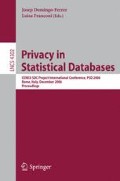Abstract
Controlled Rounding is a technique to replace each cell value in a table with a multiple of a base number such that the new table satisfies the same equations as the original table. Statistical agencies prefer a solution where cell values already multiple of the base number remain unchanged, while the others are one of the two closest multiple of the base number (i.e., rounded up or rounded down). This solution is called zero-restricted rounding. Finding such a solution is a very complicated problems, and on some tables it may not exist. This paper presents a mathematical model and an algorithm to find a good-enough near-feasible solution for tables where a zero-restricted rounding is complicated. It also presents computational results showing the behavior of the proposal in practice.
Access this chapter
Tax calculation will be finalised at checkout
Purchases are for personal use only
Preview
Unable to display preview. Download preview PDF.
References
Bacharach, M.: Matrix rounding problem. Management Science 9, 732–742 (1966)
Causey, B.D., Cox, L.H., Ernst, L.R.: Applications of transportation theory to statistical problems. Journal of the American Statistical Association 80, 903–909 (1985)
Cox, L.H.: Controlled rounding. INFOR 20, 423–432 (1982)
Cox, L.H.: A constructive procedure for unbiased controlled rounding. Journal of the American Statistical Association 82, 520–524 (1987)
Cox, L.H., George, J.A.: Controlled rounding for tables with subtotals. Annals of Operations Research, 141–157 (1989)
Dalenius, T.: A simple procedure for controlled rounding. Statistisk Tidskrift 3, 202–208 (1981)
Fagan, J.T., Greenberg, B.V., Hemmig, R.: Controlled rounding of three dimensional tables. Technical report, Bureau of the Census, SRD/RR-88/02 (1988)
Fellegi, I.P.: Controlled random rounding. Survey Methodology, 123–133 (1975)
Moravek, J., Vlach, M.: On necessary conditions for the existence of the solution to the multi-index transportation problem. Operations Research, 542–545 (1967)
Salazar, J.J.: A unified mathematical programming framework for different statistical disclosure limitation methods. Operations Research 53(3), 819–829 (2005)
Salazar, J.J.: Controlled rounding and cell perturbation: Statistical disclosure limitation methods for tabular data. Mathematical Programming 105(2–3), 251–274 (2006)
Author information
Authors and Affiliations
Editor information
Editors and Affiliations
Rights and permissions
Copyright information
© 2006 Springer-Verlag Berlin Heidelberg
About this paper
Cite this paper
González, J.J.S. (2006). A New Approach to Round Tabular Data. In: Domingo-Ferrer, J., Franconi, L. (eds) Privacy in Statistical Databases. PSD 2006. Lecture Notes in Computer Science, vol 4302. Springer, Berlin, Heidelberg. https://doi.org/10.1007/11930242_3
Download citation
DOI: https://doi.org/10.1007/11930242_3
Publisher Name: Springer, Berlin, Heidelberg
Print ISBN: 978-3-540-49330-3
Online ISBN: 978-3-540-49332-7
eBook Packages: Computer ScienceComputer Science (R0)

